Contents
Carrots are considered one of the main sources of carotene, which is broken down in the human liver to vitamin A. Vitamin A is one of the components of many important processes in the human body:
- is a component of rhodopsin responsible for night vision;
- accelerates the healing of superficial skin lesions;
- helps maintain skin elasticity;
- helps to increase immunity.
All of these benefits occur at the cellular level. It makes no sense to smear scratches with carrot juice in the hope of accelerated healing.
Parents usually know about the benefits of vitamin A and carrots as a source of carotene, and they try to feed their child with carrots, looking for sweet varieties, since not all children are enthusiastic about parental ideas.
Especially for children, not only sweet, but also very juicy crispy carrots were bred. After all, just chewing something sweet is not as interesting as eating something sweet and crunchy.
Varieties of “children’s” juicy carrots
Children’s Sweet
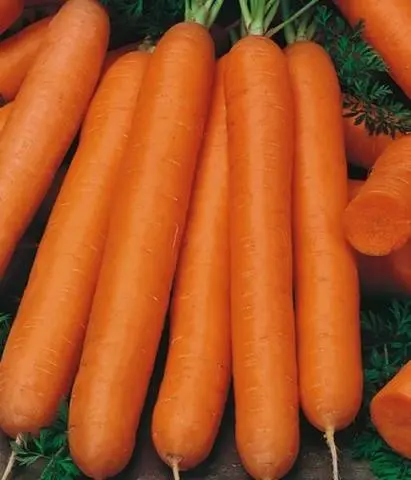
Mid-season variety of carrots with elongated cylindrical roots. The root crop has a rich orange color. The core is darker than the shell. It is widely used for making freshly squeezed varieties and baby purees.
Ripens 110 days. It is sown at the end of April to a depth of 15 mm. The variety withstands frosts down to -4°C. Carrots can be sown before winter. Winter crops are sown after a steady decrease in temperature to +5°C. Usually it is October – early November. Seeds are planted to a depth of 1 cm and mulching is mandatory.
The dimensions of the root crops of this variety: length 10-15 cm, weight 90-130 g.
Children’s joy
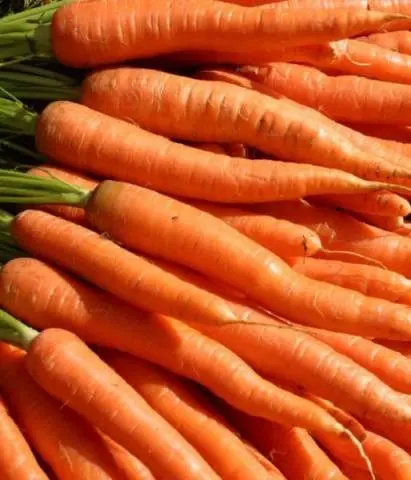
The variety contains 19 mg of carotene per 100 g of dry matter and 8,5% of saccharides. Its pleasant taste is liked by both children and adults.
Carrots ripen in 100 days. The fruits are bright orange. The mass of root crops is 120 g with a length of 20 cm. Such a small diameter of a carrot is very well suited for those who like to eat carrots directly from the garden. Yes, most of them are children.
The variety is sown from the end of April at a soil temperature of + 6 °. In general, the care for carrots of this variety is the same as for others. Plantings are thinned out in two steps, finally leaving a distance of 6 cm between root crops.
Watering is carried out evenly, taking into account the characteristics of the region, during the entire growing period. Optimal watering time: evening. Water costs:
- for young carrots: half a bucket per m²
- for an adult 7 l / m² once every 9 days.
On dry and hot days, watering starts with 3 l / m², after a couple of days the amount of water is increased to 7 l / m². Water is poured out gradually so that the soil is saturated with moisture. If a lot of water is poured into dry soil at once, the carrots will crack and become unsuitable for long-term storage.
Children’s F1
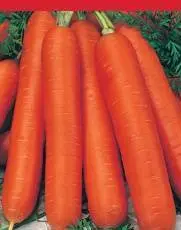
Mid-season variety that can be harvested on the 105th day after sowing. The fruits are long, 18 cm. The same diameter along the entire length. Contains a large amount of carotene, is used in dietary and baby food. Suitable for long term storage.
Prefers well-lit areas. In the shade, it loses taste and reduces yield.
Juicy sweet
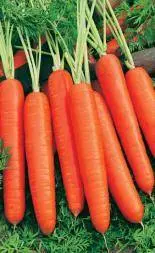
Mid-season variety with beautiful even root crops up to 20 cm long. Fruit weight 100 g. Color is bright orange, the core is almost invisible. Planted in April-May, harvested in August-September.
For the convenience of consumers, the manufacturer today offers seeds of this variety on a tape and in gel dragees.
The tape with seeds is placed “on edge” in grooves 15-20 mm deep. The grooves must first be watered. After the tape is covered with peat or sawdust and periodically watered. When planting carrots on a tape, there is no need to thin out the plantings.
New planting method: seeds in a gel pellet.
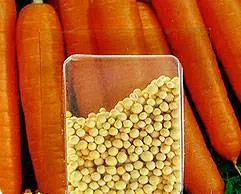
Seeds in such a dragee for the first time (2 weeks) after planting do not need watering. But they are planted in the same way as ordinary seeds.
Sweet Toothpiece
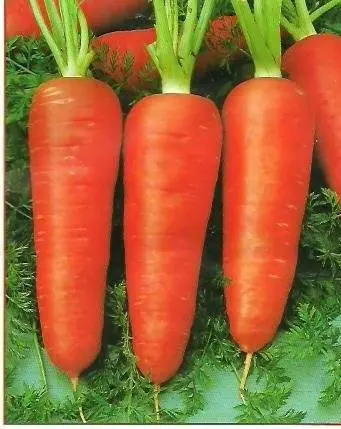
Probably the best variety of carrots with one small drawback: late ripening. It takes 4 months to mature. Grows best on light loam.
The variety is excellently stored in winter, including in the ground, frost-resistant. Can be sown before winter.
Root crops are conical, large, weighing 100 g. They contain an increased amount of saccharides and provitamin A. Recommended for baby food and freshly squeezed juices. It can be used for these purposes even in winter.
In stores, alas, such carrots are rare. And most often it tastes bitter because of the abundance of chemicals in it. It is dangerous to feed these carrots even to animals.
Early ripe varieties of carrots are very juicy, but almost all of them are unsweetened.
Reviews about “children’s” varieties of carrots
According to reviews, the sweetest carrots “for adults” belong to the following varieties:
Varieties of juicy carrots “for adults”
Tenderness

Carrots with a high content of sugars. The variety is mid-season, it can be laid for long-term storage.
It takes about 100 days to mature. With proper cultivation, it grows up to 20 cm. This variety can be sown from March to June. If you plant the seeds in several steps with a time gap, then you can collect fresh carrots from June to October.
The manufacturer today offers seeds of this variety in a gel dragee. The gel allows the first time not to worry about the lack or excess of moisture, protecting the seed from adverse conditions.
After watering, the gel absorbs some of the water and gradually gives it to the seed. Excess water passes by. Thus, during a drought, the seed is provided with water, and during heavy rains it is protected from the “swamp”.
Agrotechnics when planting seeds in gel pills is very simple:
- seeds are sown at a distance of 20 mm from each other and watered;
- sprinkle with earth and thoroughly spill again;
- forget about crops for a couple of weeks.
After 2-3 weeks, the crops are looked after according to the standard method.
Slastena
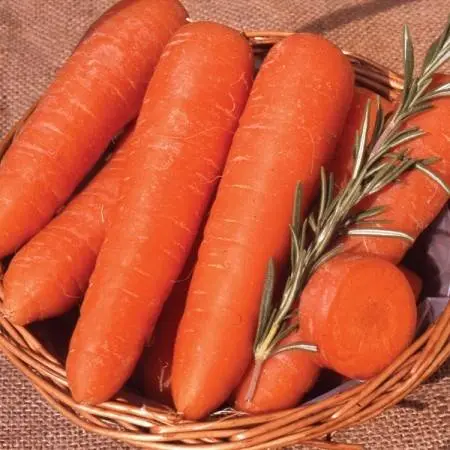
Recommended for cultivation in the Volga-Vyatka region. The amount of saccharides in the variety is above average, reaching 8,6%. With an average level of carotene of 9 mg / 100 g, the Slastena variety contains up to 16,5 mg. Root crops on average 120 g. “Sweetie” is recommended for long-term storage, freezing, canning. Of course, it is also consumed fresh.
Having a high yield (up to 90%), it is well suited not only for a private garden, but also for industrial cultivation.
Vitamin 6
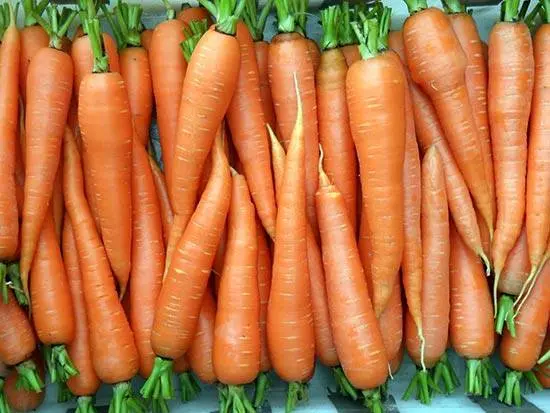
Yielding mid-season carrots, well suited for canning, freezing, long-term storage, making juices. Due to the very high content of carotene (up to 22 mg / 100 g) it is recommended for fresh consumption and for the manufacture of baby food.
Root crops are pointed, cylindrical, with an average weight of 150 g. The length of carrots of this variety is 15 cm.
Best of all, this variety of carrots grows in loams and sandy loams. Seeds are usually sown in the last days of April in grooves 30 mm deep. The distance between the grooves is 0,2 m. 2 weeks after planting, the first thinning is carried out, the second – after the carrot reaches a diameter of 10 mm. Between plants it is recommended to maintain a distance of 50 mm. Carrots should be harvested 100 days after sowing.
The variety can be sown before winter. Winter crops are sown at temperatures below +5°C to a depth of 20 mm and crops are mulched to protect seeds from frost.
Nantes 4
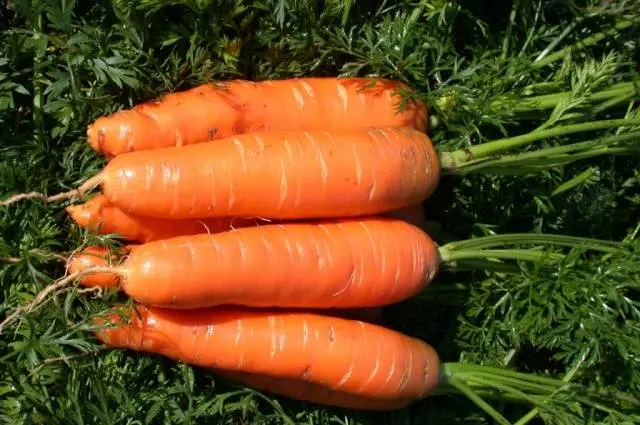
Mid-season variety of carrots with a ripening period of 90 days. It is very plastic in relation to growing conditions, therefore it is recommended for all regions. Grows in open ground.
The length of the root is 15 cm, weight 140 g. The content of saccharides is moderate, and the amount of carotene is very high: 19 mg / 100 g.
The variety is soft. During storage, it does not rot and is not covered with mold. Ripe fruits protrude slightly from the ground, which is bad for the taste of the root crop. When exposed to sunlight, solanine is formed in carrots in the same way as in potatoes.
With prolonged storage, solanine penetrates deep into the root crop, giving it a bitter taste. To eliminate this problem, the protruding part of the carrot must be sprinkled with earth.
Olympus
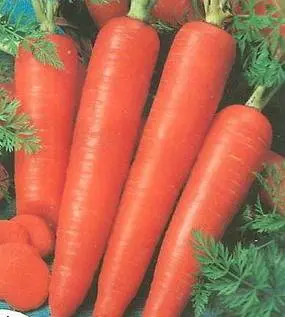
Late-ripening, well-known carrot variety of French origin. Differs in excellent productivity in the region of the Middle strip. The harvest record (995 c/ha) was recorded in the Tula region.
As an industrial variety, Olympus has an even shape of rather large root crops. Carrots of this variety grows up to 130 g.
The variety prefers slightly acidic light soils. It is sown in April at a depth of 15 mm. Harvesting is carried out in August – September.
Reviews about “adult” varieties of carrots
Why carrots are bitter
carrot fly
Very often, carrots are bitter due to damage by carrot fly larvae.

Bitterness is just a root reaction to damage that looks like this
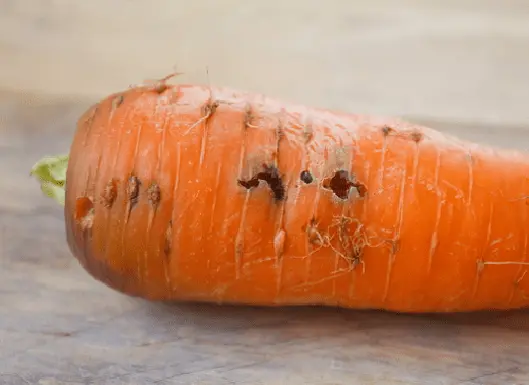
A sign of damage to carrots by a fly are leaves with a red-violet color. Such plants are immediately removed.
Solanin
It is formed if the top of the carrot is bare. During storage, solanine gradually penetrates into the tissues of the root crop and the carrot begins to taste bitter. There is only one way to fight: when growing, do not allow the tops to be exposed.
Fungal diseases
Simply put, rubbish. The fungus destroys the tissue of the carrot, resulting in a bitter taste in the apparently undamaged portion of the root.
The remaining reasons are not dangerous to health, but are laid down during the growth period:
- insufficient watering;
- too much mineral fertilizers;
- late harvesting of root crops and, as a result, their overripeness;
- insufficiently fertile land.
With proper agricultural practices, the vast majority of these causes will disappear by themselves and the carrot will be sweet, juicy and crispy.
Another reason for bitterness: an attempt to grow a second generation from seeds obtained from an F1 hybrid. In hybrids of the second generation, the properties of the wild ancestor of carrots begin to dominate. And the root of the wild ancestor is not only bitter, but also has a lignified core.
It should be noted that in fact the benefits of carrots are greatly exaggerated. The myth about improved vision (nearsightedness) as a result of eating carrots is another English hoax, which, along with the pharaoh dog and the Afghan hound, has survived decades. Only unlike the last two, the carrot story did not pursue commercial purposes, but was supposed to hide the fact that RAF aircraft used radar during night sorties during World War II.
The second argument against excessive consumption of carrots is that carotene is found in many foods besides carrots. In young nettles, it is 10 times more than in carrots. Orange color is not a sign of the presence of a large amount of carotene. Melon, broccoli, all traditional greens also contain beta-carotene. Vitamin A and carotene accumulate in the liver and are consumed as needed. There is no need to consume foods with carotene every day.
But it is very easy to overdose a vitamin with excessive consumption of the same carrots.
All of the above applies to carrot juice. It is even easier to overdose than just a root vegetable. No one will be pleased with non-infectious hepatitis or the birth of a child with pathology, if a pregnant woman is carried away by carrot juice as a natural and healthy product.









